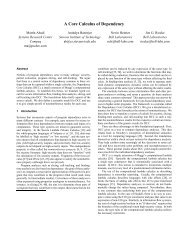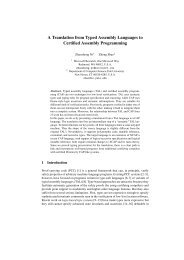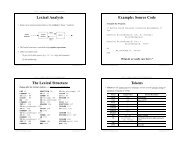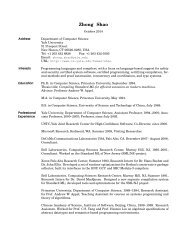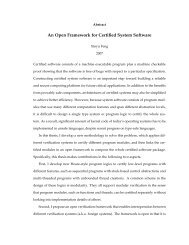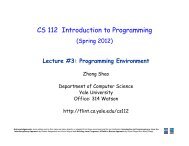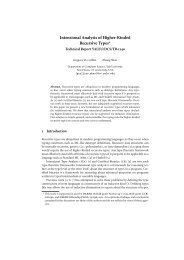1/10/12 1 - Yale University
1/10/12 1 - Yale University
1/10/12 1 - Yale University
You also want an ePaper? Increase the reach of your titles
YUMPU automatically turns print PDFs into web optimized ePapers that Google loves.
Overview Overview<br />
CS 1<strong>12</strong> Introduction to Programming<br />
(Spring 20<strong>12</strong>)<br />
Lecture #1: Introduction<br />
Zhong Shao<br />
Department of Computer Science<br />
<strong>Yale</strong> <strong>University</strong><br />
Office: 314 Watson<br />
http://flint.cs.yale.edu/cs1<strong>12</strong><br />
Acknowledgements: some slides used in this class are taken directly or adapted from those accompanying the two textbooks: Introduction to Programming in Java: An<br />
Interdisciplinary Approach by Robert Sedgewick and Kevin Wayne and Building Java Programs: A Back to Basics Approach by Stuart Reges and Marty Stepp <br />
What is CS1<strong>12</strong><br />
What is COS <strong>12</strong>6 Broad, but technical, intro to computer science.<br />
A broad, programming-centric introduction to computer science<br />
Goals.<br />
Goals.<br />
! Demystify computer systems.<br />
Demystify computer systems<br />
! Empower you to exploit available technology.<br />
Empower you to exploit available technology<br />
! Build awareness of substantial intellectual underpinnings.<br />
Build awareness of substantial intellectual underpinnings<br />
Topics.<br />
Topics<br />
! Programming in Java.<br />
Programming in Java<br />
! Machine architecture.<br />
Key program design techniques & problem-solving skills<br />
! Theory of computation.<br />
Programming tools & important libraries and data structures<br />
! Applications to science, engineering, and commercial computing.<br />
Applications to science, engineering, and commercial computing <br />
“ Computers are incredibly fast, accurate, and stupid; humans<br />
are incredibly slow, inaccurate, and brilliant; together they<br />
are powerful beyond imagination. ” ! Albert Einstein<br />
2<br />
Why Programming<br />
Languages<br />
Why programming Need to tell computer what to do.<br />
Machine languages. Tedious and error-prone.<br />
“Please simulate the motion of N<br />
heavenly bodies, subject to Newton’s<br />
laws of motion and gravity.”<br />
Prepackaged software solutions. Great, they do exactly what you want.<br />
Natural languages. Ambiguous and hard for computer to parse.<br />
Kids Make Nutritious Snacks. <br />
Red Tape Holds Up New Bridge. <br />
Police Squad Helps Dog Bite Victim. <br />
Local High School Dropouts Cut in Half. <br />
[ real newspaper headlines, compiled by Rich Pattis ]<br />
High-level programming languages. Acceptable tradeoff.<br />
Programming. Enables you to make a computer do anything you want.<br />
well, almost anything<br />
[stay tuned]<br />
“Instead of imagining that our main task is to instruct a computer<br />
what to do, let us concentrate rather on explaining to human<br />
beings what we want a computer to do.” – Donald Knuth <br />
Ada Lovelace<br />
Analytic Engine
Why Program<br />
Our Choice: Java<br />
Why program<br />
A natural, satisfying and creative experience.<br />
<br />
<br />
Enables accomplishments not otherwise possible.<br />
Opens new world of intellectual endeavor.<br />
First challenge. Learn a programming language.<br />
Java features.<br />
Widely used.<br />
<br />
<br />
<br />
Widely available.<br />
Embraces full set of modern abstractions.<br />
Variety of automatic checks for mistakes in programs.<br />
Next question. Which one<br />
Naive ideal. A single programming language.<br />
Java economy.<br />
Mars rover.<br />
Cell phones.<br />
Blu-ray Disc.<br />
Web servers.<br />
Medical devices.<br />
Supercomputing.<br />
…<br />
$<strong>10</strong>0 billion,<br />
5 million developers<br />
James Gosling<br />
http://java.net/jag<br />
Learning a Programming Language<br />
Programming is like Legos…<br />
Just like learning any new language<br />
syntax: new words<br />
<br />
<br />
<br />
grammar: how to put them together<br />
programming: telling a coherent story<br />
library: use plots already written<br />
Initially needs efforts, but pays off in the end !
Topics Covered<br />
Intended mainly as your first programming course !<br />
The goals of cs1<strong>12</strong> are to learn:<br />
11<br />
program design techniques: how<br />
to model real world and<br />
manage complexity, e.g.,<br />
– structural programming: top<br />
-down vs. bottom-up<br />
– object-oriented programming:<br />
abstraction and modularity<br />
problem-solving skills, e.g.,<br />
– how to solve a problem<br />
efficiently, elegantly<br />
– debugging; root cause analysis of<br />
problems; how to fix them<br />
– novel problem solving skills:<br />
recursion; fun algorithms<br />
good programming style, e.g.,<br />
– robust, efficient program,<br />
readable code; documentation<br />
how to use important libraries<br />
and data structures, e.g.,<br />
– graphics, sound, animation, GUI<br />
– arrays, strings, lists, stacks,<br />
queues<br />
programming tools<br />
– Java programming language and<br />
supporting tools & compilers
Course Personnel<br />
Instructor: Zhong Shao zhong.shao@yale.edu<br />
http://www.cs.yale.edu/~shao/<br />
Office: AKW 314<br />
Textbook (required):<br />
Course Information<br />
Introduction to Programming in Java:<br />
An Interdisciplinary Approach<br />
Teaching fellows: office hours and lab sessions to be announced<br />
<br />
<br />
<br />
<br />
<br />
<br />
Pedro Alves <br />
Yitzchak Lockerman <br />
Michael (Fitz) Nowlan <br />
Aaron Segal <br />
Fei Xue <br />
……<br />
Undergraduate lab assistants to be announced<br />
Optional:<br />
Building Java Programs:<br />
A Back to Basics Approach.<br />
Other recommended books<br />
listed online<br />
Information, lecture notes, & assignments are available on the<br />
course web site or the <strong>Yale</strong> class server<br />
Course Workload<br />
Assignments Workload<br />
Two exams: one midterm, one final<br />
– one exam == two assignments<br />
Assignments: 9 -- <strong>10</strong> in all<br />
All assignments are programming assignments<br />
– from small and easy to large and more interesting<br />
q Time spent on assignments reported by students (fall 2005)<br />
– all assignments are posted online (no paper handout)<br />
– all assignments must be submitted online<br />
– Due on the date specified in the schedule page<br />
They are usually fun and rewarding: n-body simulation, recursive<br />
fractals, critter simulation, guitar-hero, DNA sequence alignment,<br />
……<br />
One or two bonus [optional] assignments to replace lowest grades<br />
<strong>10</strong>0%<br />
90%<br />
80%<br />
70%<br />
60%<br />
50%<br />
40%<br />
30%<br />
20%<br />
<strong>10</strong>%<br />
0%<br />
Assignment: Hangman<br />
0 2 4 6 8 <strong>10</strong> <strong>12</strong><br />
hours
How to do well in this course<br />
Should you Take this Course<br />
Keep up with the assignments<br />
<br />
<br />
The course material is cumulative<br />
From a former student: Procrastination will eventually come around<br />
to bite you in the ass!<br />
If you dont understand something, ask questions (especially WHY).<br />
<br />
<br />
Theres no such thing as a dumb question.<br />
Computers are neither magical nor mysterious. Everything can be<br />
explained!<br />
No<br />
I hate computers.<br />
I like fuzzy solutions.<br />
– Programming forces you to solve problem precisely.<br />
I refuse to think logically.<br />
I want to take an easy class.<br />
– Hard for those who find difficulty in logical thinking and<br />
who dont pay attention to precision.<br />
Discuss your design with others<br />
Should you Take this Course<br />
Yes/no<br />
I want free gourmet meals and to make lots of money by<br />
working for Google.<br />
World of Warcraft rocks hardcore!<br />
Everyone, look at my Facebook farm! <br />
Should you Take this Course<br />
Yes<br />
Computers and robots are going to take over the world. I<br />
want to befriend them so that my life will be spared.<br />
I have to take this class.<br />
I like to solve problems.<br />
I like to learn new perspectives on how to solve problems<br />
…
What Kind of Class is This<br />
What Kind Of Class is This<br />
Sort of engineering<br />
building things that realize a desired objective<br />
Sort of philosophy<br />
formal logic, deductive systems and semantics<br />
Philosophy, Psychology, Foreign Language, Engineering, Politics,<br />
Sociology, Biology, Physics, and Business rolled into one!<br />
Sort of foreign language<br />
how to communicate with a computer effectively<br />
Sort of psychology<br />
given some output behavior, what is going on internally<br />
Comment on Course Eval<br />
We only work with java, but honestly the class isn't about<br />
learning a language so much as it is learning how to think like<br />
a programmer. This class was great for that purpose, indeed,<br />
I would argue that such a class is actually what a QR<br />
requirement should be -- not merely quantitative reasoning<br />
but thinking in terms of a formal system and how to<br />
translate complex tasks into simple tasks that can be<br />
accomplished with formal statements.<br />
Miscellaneous points<br />
Java is an extremely popular language for writing software in<br />
the real world<br />
<br />
But you will not be hirable as a Java developer just from<br />
taking this class<br />
So why should you take this class<br />
<br />
<br />
It will develop your logical mind<br />
Gives you a flavor of CS<br />
<br />
65% of you will have to talk to software developers on a<br />
regular basis in whatever profession you choose when you<br />
graduate --- this class will help you communicate with them
Comment on Course Eval<br />
Basically, programming is just problem solving. If you think<br />
you're someone who likes to solve problems, then definitely<br />
take this class. […] I do have to warn you about the problem<br />
sets, though. They start out very easy, but get pretty hard<br />
because you have to build on your prior knowledge. Debugging<br />
your program can be the most annoying thing in the world,<br />
since hitting the shift key while typing the equals sign can<br />
cost you about 5 hours' worth of time looking for it<br />
(personal experience). So start on the problem sets early,<br />
and don't hesitate to ask the TA's for help--you'll probably<br />
need it at least once, such as on the last problem set. <br />
Programming<br />
Its about solving problems<br />
Patience is a virtue<br />
Dont wait until the last minute<br />
Dont blame the computer



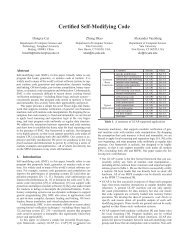
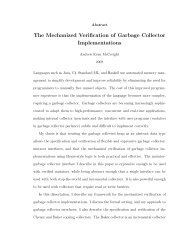
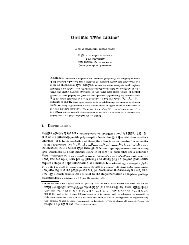
![A Tutorial on [Co-]Inductive Types in Coq - The Flint Project](https://img.yumpu.com/43409031/1/190x245/a-tutorial-on-co-inductive-types-in-coq-the-flint-project.jpg?quality=85)

